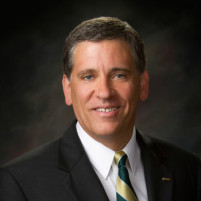Cal Poly administration accused of misspending student fees
May 15, 2020

President Jeffrey Armstrong
A state audit found Cal Poly has the highest student fees in the California State University system and the San Luis Obispo campus’s student fees have increased by 72 percent over the past eight academic years.
The audit likewise found Cal Poly has violated the CSU system student fee policy and has made questionable use of the revenue it has generated from fees, primarily by spending tens of millions of dollars on salaries and benefits.
California’s state auditor conducted a review of mandatory student fees at four CSU campuses: Cal Poly, Chico State, San Diego State and San Jose State. Campuses have not sufficiently justified their needs when proposing fees or fee increases, and the CSU Chancellor’s Office has not ensured administrators adequately consult with students about proposals, the audit found
Some student fees are optional because they are for specific purposes, like on-campus housing and parking. But, universities also charge mandatory student fees.
In the current academic year, Cal Poly’s mandatory student fees total $4,201. Fresno State has the lowest amount of student fees in the CSU system, $847 a year.
Since 2011-2012, CSU trustees have raised tuition by $270, or 5 percent. Over that period, Cal Poly raised mandatory student fees by 72 percent, from $2,439 to $4,201, the largest increase in the CSU system.
Mandatory student fees comprise an increasing proportion of total enrollment costs for students, according to the audit report. Since not all scholarships and grants cover student fees, some students who are eligible for financial aid must pay out of pocket or take on student loans to cover the fees.
Auditors said they expected campuses to use mandatory fee revenue to fund core CSU functions of instructing and graduating students. However, they found three campuses, including Cal Poly, have spent millions of dollars in student fee revenue on salaries and benefits.
In 2017, Cal Poly collected $80 million in mandatory student fee revenue. The following year, Cal Poly spent nearly $31 million of mandatory fee revenue on salaries and benefits.
Auditors also found Cal Poly did not collect or consider required recommendations from a campus committee before university President Jeffrey Armstrong made decisions about five proposed fee changes. Additionally, when Cal Poly implemented a student success fee that currently totals $878, administrators did not calculate the fee amount based on specific projected expenditures, a violation of CSU policy.
“The letter from Cal Poly’s president to the chancellor requesting approval of the student success fee offered no reason or justification for the specific fee amount,” the audit report states.
However, auditors did find Cal Poly’s administration twice chose not to move forward with proposed fees after students voted against them.
Chico State administrators, on the other hand, overrode the results of three unsuccessful student votes in 2018 and imposed fees, despite more than 60 percent of student voters opposing them. Under state law, one of the three votes should have been mandatory, according to the audit.
The state auditor is now recommending California legislators change state law so that binding student votes must take place when universities propose student fees or student fee increases. Likewise, the auditor is recommending the Legislature prohibit campuses from charging mandatory fees to fund any of the CSU’s core functions.






The comments below represent the opinion of the writer and do not represent the views or policies of CalCoastNews.com. Please address the Policies, events and arguments, not the person. Constructive debate is good; mockery, taunting, and name calling is not. Comment Guidelines